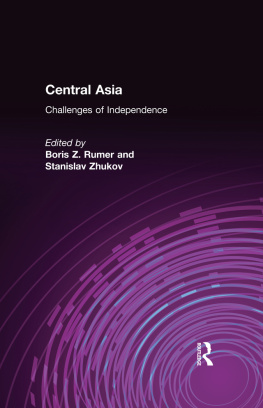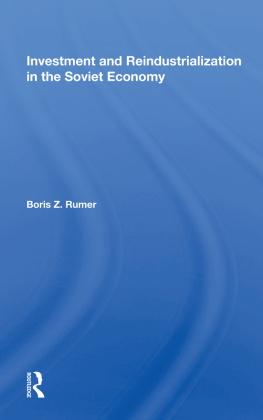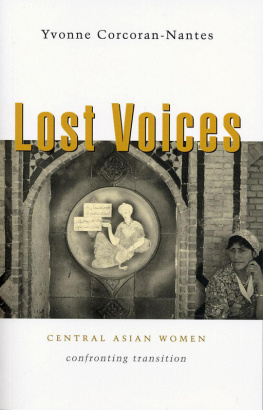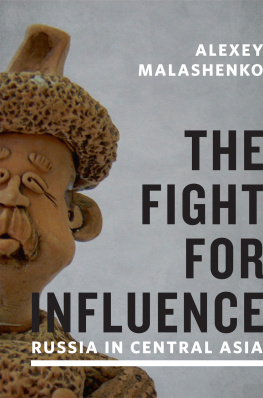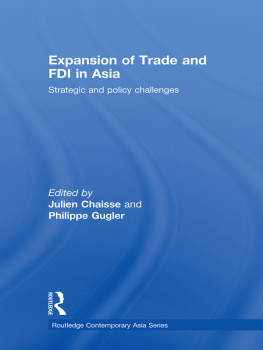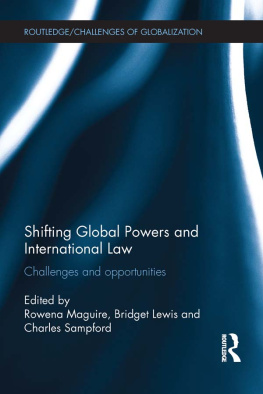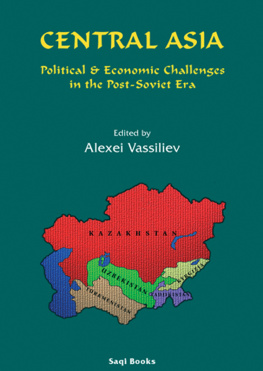CENTRAL ASIA
Also from M. E. Sharpe
THE RUSSIAN FAR EAST
An Economic Handbook
Pavel A. Minakir, Editor
CENTRAL ASIA IN TRANSITION
Dilemmas of Political and Economic Development
Boris Rumer, Editor
Central Asia
The Challenges of Independence
Edited by
Boris Rumer
Stanislav Zhukov
First published 1998 by M.E. Sharpe
Published 2015 by Routledge
2 Park Square, Milton Park, Abingdon, Oxon OX14 4RN
711 Third Avenue, New York, NY 10017, USA
Routledge is an imprint of the Taylor & Francis Group, an informa business
Copyright 1998 Taylor & Francis. All rights reserved.
No part of this book may be reprinted or reproduced or utilised in any form or by any electronic, mechanical, or other means, now known or hereafter invented, including photocopying and recording, or in any information storage or retrieval system, without permission in writing from the publishers.
Notices
No responsibility is assumed by the publisher for any injury and/or damage to persons or property as a matter of products liability, negligence or otherwise, or from any use of operation of any methods, products, instructions or ideas contained in the material herein.
Practitioners and researchers must always rely on their own experience and knowledge in evaluating and using any information, methods, compounds, or experiments described herein. In using such information or methods they should be mindful of their own safety and the safety of others, including parties for whom they have a professional responsibility.
Product or corporate names may be trademarks or registered trademarks, and are used only for identification and explanation without intent to infringe.
Library of Congress Cataloging-in-Publication Data
Central Asia: the challenges of independence / edited by
Boris Rumer and Stanislav Zhukov: translated by Gregory Freeze.
p. cm,
Includes bibliographical references and index.
ISBN 0-7656-0254-7 (hardcover: alk. paper)
1. Asia, CentralEconomic conditionsCongresses.
2. Asia, CentralEconomic policyCongresses.
3. Asia, CentralForeign economic relationsCongresses.
I. Rumer, Boris Z. II. Zhukov, S. V. (Stanislav Viacheslavovich)
HC420.3.C465 1998
338.958dc21 98-15194
CIP
ISBN 13: 9780765602541 (hbk)
The preparation of this collection of essays was made possible by the Sasakawa Peace Foundation (SPF). For a number of years, SPF has conducted an ambitious and highly productive program, "Implementing a Market Economy in Central Asia: Implications from the East Asian Experience." That program has supported a broad range of empirical research, training, and education to help the countries of Central Asia to facilitate and maximize opportunities in market transformation. A substantial part of this book was presented in the form of papers at the third Issyk-Kul Forum, which was organized by SPF and held in Tashkent (October 1997). It is a great pleasure to acknowledge the contribution of SPF and, in particular, Mr. Akira Iriyama, Mr. Takashi Shirasu, and Mr. Lau Sim Yee, in making the preparation and publication of this book possible.
In addition, the editors wish to express their gratitude to the National Council for Eurasian and East-European Research (Washington, DC) and the Boston Institute for Developing Economies (Boston), which supported the research upon which (on economic integration) is based. Thanks too are due to Gregory L. Freeze for his assistance in preparing the manuscript for publication. Finally, the editors also wish to acknowledge the support of their home institutionsthe Davis Center for Russian Studies (Harvard University) and the Center of Comparative Research of Russia and the Third World (Institute of World Economy and International Relations, Russian Academy of Sciences).
Central Asia
Introduction
Boris Rumer and Stanislav Zhukov
The current surge of interest in post-Soviet Central Asia derives largely from the fact that the world recognizes its enormous potential as a source of oil and natural gas. This region is regarded as an energy and fuel reserve for industrially developed countries. Thus, an editorial in the Washington Post offers this bald statement on the West's interest in this region: "The broad Western strategy must be to take the political steps necessary to exploit the immense energy resources of the Caspian Sea area. In this way, the West can diminish dependence on the oil and gas of the uncertain states of the Persian Gulf."into account. For, in the final analysis, the grandiose oil and gas projects will depend on whether these Central Asian countries can overcome their protracted economic crisis and thereby maintain political and social stability, or ineluctably slide toward balkanization and civil war.
Six years have now elapsed since these states acquired independence. That is a sufficient period of time to determine the basic economic problems that face each of these new countries and their prospects for future development. It is important to consider how these countries have used this historic opportunity, whether ruling elites have met the challenges of independence and economic development, how successful they have been in using the economic potential inherited from the former Soviet Union, and whether they have devised and implemented a coherent, national strategy of development.
Not one of the five Central Asian states (Kazakhstan, Kyrgyzstan, Tajikistan, Turkmenistan, and Uzbekistan) existed as a sovereign entity in modern history, and the very acquisition of independence came suddenly and unexpectedly. In any case, they did not undergo a prolonged anticolonial, anti-imperial struggle to prepare them for independence. On the contrary, the party elites (nomenklatura ) of Central Asia actually resisted, to the very end, the breakup of the USSR.
But the dissolution of the Soviet Union by the Slavic republics (Russia, Belarus, and Ukraine), together with Russia's adoption of the "shock therapy" variant of economic reform, forced the Central Asian countries to proclaim their sovereignty and independence. Russia's decision to issue its own national currency then forced these states to undertake fundamental economic reform.
The disintegration of a unified Soviet economy, the disruption of ties among the former republics, the frequent changes in economic policy, the unprecedented rapid rates of privatization and de-statificationall these things have generated a rapid pace of change. The application of diverging, contradictory policies, which have affected virtually every sphere of the economy and society and which had proceeded at a high pace, makes it difficult to grasp the essence of these changes. The countries of Central Asia have yet to achieve a fundamental breakthrough and restructuring of the old system and, in some branches and spheres, have not yet even begun. However, as the time since the breakup of the USSR increases, it becomes increasingly clear that both the current economic situation and the prospects of economic development in the region are determinedto a significant degreeby a number of objective factors.

